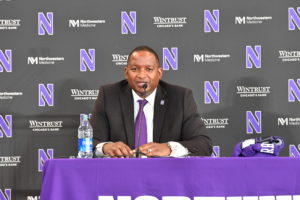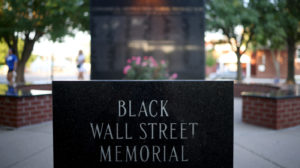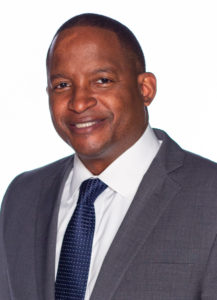Today saw Dr. Derrick Gragg formally unveiled as the 23rd Athletic Director at Northwestern University, succeeding the ultra short tenure of the scandal-plagued Mike Poliskey. But in the greater sense Gragg is following in the foot steps of Dr. Jim Philipps, who is now ACC Commissioner.
Gragg is a lot like Phillips in that he’s an innovator, bringing big and important events to life. One such example is the Tulsa Legacy Game, started with the intention of bringing greater awareness to the Tulsa Race Massacre in 1921.
Hundreds were killed and more than a thousand buildings looted and burned in the city’s Greenwood District, known as Black Wall Street, on May 31 and June 1, 1921. One of the most affluent African American communities in the United States, stretching 40 square blocks, it was wiped out a century ago.
Almost completely whitewashed from history, very few Americans had much knowledge of these horrific events, until a year or so ago. This despite the Oklahoma Historical Society declaring the tragic two days as “believed to be the single worst incident of racial violence in American history.”
This is what happens when history sometimes get written by white supremacists.
Many Americans have been wondering why they don’t know more about these specific atrocities, and the centennial, which just passed, has brought it back to the forefront. ntil a couple years ago.
“There’s been a lot of talk of the 1921 Race Massacre in Tulsa that eliminated the most prominent section of African-American (community), Gragg said today on a podium in Wilson Field at the Ryan Fieldhouse.
“Not only the loss of lives, but everything that was destroyed there and it’s never recovered, (I saw it first hand) being in that city for seven years.”
After the destruction, which was partially perpetrated by the city’s police department and the county sheriff, the government employed racially driven fire codes to prevent Greenwood’s rebuilding. In later decades, Tulsa deliberately planned the interstate highway to run straight through it, thereby cutting the district off from the rest of the city, and therefore ensuring it could never be rebuilt.
Today, Greenwood is just two blocks. Gragg served as Tulsa University A.D. from 2013-2020, before going to the NCAA, where he served as senior vice president for inclusion, education and community engagement.
He credits then Tulsa Defensive Backs Coach Aaron Fletcher (who’s now with Mizzou) as the idea man behind the Legacy Game.
“I like coaches like that, we’re so multi-dimensional like that, people think we just do sports,” Gragg said of Fletcher on Monday.
“He’s a fine example. He left Tulsa and now he’s at the University of Missouri- that’s a name you should keep up with he’s going to be a head coach one day.”
asst football coach aaron fletcher had a lot to do with it
The Tulsa Golden Hurricane beat the East Carolina Pirates 34-30 in the first Legacy Game, last October. It will now be an annual affair.
“It’s a fantastic way to bring everyone together to talk about the issues of social justice,” Gragg continued.
“Because this is the 100 year anniversary it’s getting a lot of national attention. My schedule won’t allow me to be there, but I’m looking forward to it carrying on.”
President Joe Biden visited the Black Wall Street memorial earlier this month and Tom Hanks penned a guest op-ed on the massacre for the New York Times.
So it’s definitely top of mind right now, and should remain there as Juneteenth approaches. The legacy game will continue to grow in relevance in the years to come, which naturally makes us wonder if Northwestern will take part in a future edition?
“That’s a great idea,” Gragg responded.
“I’ve been thinking about that, but obviously you have to work with scheduling. If we could work something out that would be fantastic.”
As it’s college football scheduling, and non-conference at that, it’s always a long term thing to plan ahead.
“A lot of times you’re out four, five years at least- that’s what makes it a little bit more difficult.”
Paul M. Banks runs The Sports Bank, partnered with News Now. Banks, the author of “No, I Can’t Get You Free Tickets: Lessons Learned From a Life in the Sports Media Industry,” has regularly appeared in WGN, Sports Illustrated, Chicago Tribune and SB Nation. Follow him on Twitter and Instagram.






